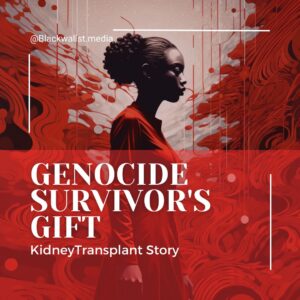HEALTH
Genocide Survivor's Gift: Kidney Transplant Story
“Genocide survivor who donated kidney to Gisimba shares story of love, compassion”
Hudson KuteesaContributor
 When Damas Gisimba suffered kidney failure in 2021, Hyacinthe Uwimana, one of the young women whom he had taken in and cared for after the 1994 Genocide against the Tutsi, donated a kidney to him.
When Damas Gisimba suffered kidney failure in 2021, Hyacinthe Uwimana, one of the young women whom he had taken in and cared for after the 1994 Genocide against the Tutsi, donated a kidney to him.
Gisimba had suffered a stroke that had left his kidneys so damaged that his doctors prescribed dialysis – a clinical purification of blood as a substitute for the normal function of the kidney.
This came as upsetting news to many people, especially those who survived the Genocide by hiding in his small orphanage in the Kig Gisimba was a national hero who saved the lives of more than 400 people, mostly children, during the Genocide.
He passed away aged 62, on June 4.
He was laid to rest on June 10. Gisimba was the Director of the Gisimba Memorial Center, a former orphanage in the Nyamirambo suburbs of Kigali where he, against huge odds, hid and rescued hundreds of orphans at the height of the 1994 Genocide against the Tutsi.
Uwimana, 37, is not one of the children who survived at the orphanage, but she stayed at the facility for a long time, having been brought to it in 1998, four years after the Genocide when her parents died.

Her family lived in Nyanza.
As the Genocide unfolded, her parents were killed but she survived along with two younger siblings.
In the aftermath of the Genocide, the three children were taken to an orphanage in their home area.
They lived there for two years before they were transferred to another orphanage in Kigali (not Gisimba’s).
The orphanage, unfortunately, did not treat them well as it was tainted with practices of ethnic divisionism.
Subsequently, the government had to close down it down and transfer the children to other facilities.
It was at this point — in 1998— that Uwimana and her two siblings, along with some other youngsters found themselves at Gisimba’s.
“We were well received and settled in among many other children. Gisimba sat us down in a hall and told us that there was no division there. He said there was neither Hutu nor Tutsi nor Twa there. He told us that all children were treated the same,” she recollects.

At that time, Uwimana was 12 years old and was among the oldest children at the orphanage.
She recalls many things about life at the facility and the good care they received from Gisimba. “We had breakfast every day. We ate bread and porridge and sometimes milk. We had the necessities that we needed at school. We did not lack anything. Some children at school actually wished they could come and live at the orphanage,” she said.
When she was done with primary school, Uwimana got sponsors who paid for her education at secondary and university levels. Later, after graduating with a bachelor’s in business from Uganda’s Kampala International University, she returned to Rwanda and worked for some years, before she found herself jobless, in 2017, and Gisimba again came to her rescue.
“At that time, he was not running an orphanage because the government had phased such facilities out. However, his son Patrick had started something called the ‘Gisimba Afterschool Program.’ So, Gisimba invited me to work with them in the finance department.”
Uwimana was still working in the finance department of the Gisimba Memorial Centre when she spoke to The New Times in her office on June 15, five days after Gisimba was laid to rest.
Working at the Memorial, she noted, had given her the chance to be close to Gisimba, and give him support at a time when he really needed it.
By now, he was older, ill, and weak. When Gisimba’s kidneys failed in 2021,
Uwimana was expectant and was due in just about two months.
Straightaway, on hearing about the doctor’s diagnosis she offered to donate her kidney; after giving birth to her baby. “At first he refused to accept a kidney donation from anyone. He did not want to put a burden on people. He strongly refused to the extent that his family stopped talking about it.”
Gisimba carried on with his routine dialysis at Kanombe Military Hospital.
But doctors advised that the medical procedure was a challenge for his weak body and warned that he may not live very long if he did not get a kidney transplant.
It was only in 2022 after Uwimana had given birth and her child was about one year and three months old that she again gathered the courage to speak to Gisimba about her willingness to donate a kidney to him. “This time, he accepted. He told me, ‘We can go and see Jules (Gisimba’s doctor),” she recalls.
Uwimana was so happy. After several tests, Gisimba and Uwimana were declared compatible receiver and donor. They then flew to Hyderabad, India, for the transplant.
They had a successful surgery.
After a month, they returned home, in August 2022.
Things were going on well. Medics in Kigali carried out some tests and Gisimba seemed to be on track to recovery.
However, all of a sudden, in early November, he started to get weaker, and in pain.
“He complained of fever. He was examined by the medics and they found that his kidney was swollen,” Uwimana said.
Later, unfortunately, Gisimba was told that the new kidney had failed. “I was not around when the news was broken. But he asked those who were around not to tell me. He requested them to let him be the one to tell me this sad news.”
“When I came to the hospital, he told me: ‘I am going to tell you bad news, but please bear with me. You did a lot and I am grateful, but the kidney has failed. Be strong, I am strong too,” she recalls.
Gisimba was then put back on dialysis. He would go to the hospital thrice a week for the procedure.
But despite his pain, he never complained. He would, at times, even come to the children’s compound in Nyamirambo and try to get busy with some of his old regular chores.
As 2023 progressed, he seemed to get better.
When the news of his passing was announced to Uwimana, she did not believe it. “I was at church when his son, Cedric, called me. I didn’t pick up the phone at first. When I called him back, he told me ‘Dad had passed.’ I told him to stop making jokes. It was hard to believe because he was not really sick those days.”
Nonetheless, she hurried to Nyarugenge Hospital where he had been admitted.
Before she entered the hospital, someone else called her and told her the same news. Uwimana was devastated.
For her, Gisimba was someone whom God gifted with love for people.
“He always told us to love each other and never deny any person support if you can support them. He told us that ‘you cannot fail to have something with which to support a person who approaches you for help. You can at least just listen to them so that they can cry and be relieved,’” Uwimana recalled.
Black Wall St. MediaContributor








